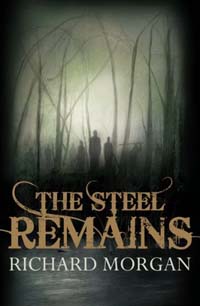By Richard Morgan

In the years following a bitter war against a lizard race, Ringil Eskiath, a renowned warrior and hero of the war, is living a quiet life of drunken debauchery, telling tales of derring-do to locals for a few coins to pay for room and board. Into his humdrum life returns his mother, and despite himself Ringil agrees to return with her, back to his estranged family, and track down a cousin who has been sold into slavery to pay her late husband’s debts. During the course of his investigation, Ringil uncovers preparations by The Dwenda, a race of ancient people, almost demi-Gods, who live between time and space to return to his world and not for the good of humanity. Along the way Ringil is reunited with two of his compatriots from the war and together they make a stand against the Dwenda as one last fight to save the world.
Best known for his gritty, dystopian science-fiction novels, Richard Morgan now sets his pen to more traditional fantasy, though given what has gone before, you know that ‘traditional’ is likely to be the last thing you’ll get. On the surface The Steel Remains has a bunch the usual fantasy tropes, an old war, a battle scarred warrior, a noble quest and mystic evildoers, but it’s what Morgan does with these elements that sets him apart and often it’s the ways in which his fantasy world resembles our real world that really mark this book out.
There is a palpable air of tension throughout Ringil’s world, the spectre of the old war is never far away, the politics of slavery and ethnic cleansing make for a harsh and uncompromising atmosphere and the threat of further war hangs heavy in the air even as the returning soldiers are greeted by an indifferent public, already forgetful of the battles fought to safeguard their lives. The parallels are obvious and the message is loud and clear but just manages to stay the right side of preachy.
Ringil is not really a reluctant hero, he revels in the role, but he is rampantly and aggressively homosexual, in a society that condemns homosexuals to public impaling (a death he knows all-too-well) and while he has been spared the fate of others due to his family’s status as minor nobles, he cannot reconcile the sacrifices made for King and Country with the politics and behaviour of those his actions save, especially his father, who cannot look past Ringil’s sexuality to the man within. This makes for a bitter and conflicted hero – the best kind, clearly – but while it’s interesting it does seem to be the book’s major driver and it’s to the detriment of the story that it becomes a point laboured.
It’s to Morgan’s credit however that the supporting cast are all very nicely drawn, with Ringil’s two compatriots given enough time and space to build into fully rounded characters before the plot inevitably brings the three friends together for the final battle. The Dwenda are fascinating, like Tolkien’s elves but violent and self-centred, and the smattering of lizards and other assorted monsters are all deftly handled while the various bits of magic, myth and technology blend seamlessly into his world and never become intrusive. The sex, like the violence, is full-on and very graphic and the language and attitude of the characters, particularly Ringil, reflects the very physical nature of their lives and, as long as you can get past that, you’ll find that they serve the story well, making this a bold and exciting read.
It’s not perfect, the language can’t make it’s mind up what century it’s from and it places it jars enough to pull you out of the story and in places the pacing slows to a crawl while you’re urging it on, but while it’s never going to compete with Joe Abercrombie or Scott Lynch there’s enough here that’s different- from a master of science fiction – to recommend it to fans of the fantasy genre or fans of Mr. Morgan’s previous work.
The Steel Remains is published by Gollanz and is available fromAmazon, Blackwell and all good book stores.
Richard Morgan maintains a website.
